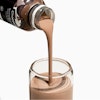🔥 Bestseller


High-protein meal shakes
35g protein
400 cal per bottle
From $58
/ $4.83 per bottle
2
In today’s world of endless and often conflicting nutrition advice, myths regarding plant-based proteins continue to circulate despite evidence proving otherwise. Our nutrition team is here to bust 5 common myths about plant protein and equip you with what you really need to know.
But first, let’s revisit the basics: why is protein so essential?
Protein is one of the three essential macronutrients we need in large amounts every day. Made up of amino acids (the building blocks of all proteins), the macronutrient plays a role in the structure and function of every cell and tissue in the body—from muscles and bones to hormones, skin, and even blood. Research shows that protein-rich meals can also help you feel fuller for longer than lower-protein meals, making it easier to maintain a balanced diet and a healthy weight.
And secondly, what is plant protein?
Simply put, plant protein is dietary protein sourced from plant-based foods. While most omnivores traditionally source their protein from animal sources, like meat, fish, eggs, and dairy products, plants make proteins too! Soy-based foods like edamame, tofu, and tempeh, as well as nuts, seeds, ancient grains like quinoa and buckwheat, and even good old peas and rice, provide us with protein.
Now, let’s dive into 5 plant-based protein myths:
A common misconception is that these proteins are ‘incomplete’, meaning they lack one or more of the nine essential amino acids. However, this isn’t entirely true. Many plant-based foods, such as quinoa, tofu, edamame, and soy milk alternatives, are naturally complete proteins and provide all nine essential amino acids. Additionally, combining different plant protein sources, such as peanut butter on wholegrain toast, can help to ensure your amino acid requirements are met. Research supports this—one review found that classic vegetarian diets provide more than adequate protein and amino acids to meet daily needs.
Some believe that protein from plants is inferior to protein from animals, but scientific evidence shows otherwise. Plant-rich diets are associated with improved heart health, a lower risk of heart disease and stroke, and additional health benefits. Plant-based protein sources also provide fibre, antioxidants, and essential micronutrients.
Beyond personal health, plant-rich diets benefit the planet, too. If the entire global population shifted to a plant-based diet, we’d be able to cut our agricultural land use by 75%, as producing a gram of protein from beef or lamb requires almost 50 to 100 times more land than a gram of pea or tofu protein. Reducing animal-based food consumption in any way we can could have a positive impact on more sustainable farming.
While animal-derived proteins can stimulate muscle protein synthesis, plant-based proteins are equally effective when consumed in the right amounts and combinations. Research shows that plant-based proteins, like wheat, can support muscle building as effectively as animal-based proteins like whey. For optimal muscle growth and repair, focus on spreading protein intake evenly throughout the day. Aim for meals that provide 20 to 40 grams of protein each to maintain consistent muscle protein synthesis.
A common myth is that plant-based proteins must be combined at each meal to provide all the essential amino acids. However, this isn’t always necessary. While some plant-based proteins may be low in one or more essential amino acids, eating a variety of plant-based foods throughout the day or even week ensures you get a balanced amino acid profile. The key is to focus on diversity in your protein sources!
A common misconception is that plant-based diets don’t offer enough variety. While vegetarians and vegans once faced challenges meeting protein needs, today, it’s easier than ever. A wide range of high-protein plant-based products is available.
Here are some helpful tips for adding more plant proteins to your diet:
Legumes like chickpeas, lentils, and kidney beans are perfect for stews, curries, or blending into houmous and spreads.
Nuts and seeds like almonds, sunflower, and pumpkin seeds are great snacks or perfect for sprinkling over salads or porridge.
Meat substitutes such as tofu, tempeh, and seitan are packed with protein.
Start your day with whole grains like oatmeal, quinoa, or buckwheat paired with fruit, nuts, and seeds.
For busy days, utilise plant-based complete meal options like Huel as a convenient way to meet your protein needs.
Plant-based proteins are a nutritious and sustainable option for meeting your dietary needs. Embracing variety helps debunk common myths and ensures a well-rounded, protein-packed diet. Whether for health, environmental, or ethical reasons, plant-based diets can offer numerous benefits without sacrificing taste or nutrition.
Words: Jessica Stansfield, Registered Nutritionist, Huel Nutrition Manager
Get 15% off your first order of $50, plus insider access to expert tips, exclusive discounts, and the latest from Huel.
This site is protected by reCAPTCHA and the Google Privacy Policy and Terms of Service apply. You can unsubscribe at any time. Huel Privacy Policy.
